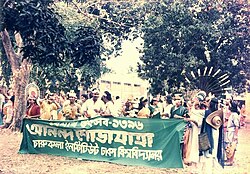
Back منغل شوبهاتجرا Arabic মংগল শোভাযাত্ৰা Assamese মঙ্গল শোভাযাত্রা Bengali/Bangla Mangal Shobhajatra German Mangal Shobhajatra Spanish Mangal Shobhajatra French Mangal Shobhajatra Italian マンガル・ショブハジャトラ Japanese Мангал Шобхаџатра Macedonian Mangal Shobhajatra Portuguese
| Mongol Shovajatra মঙ্গল শোভাযাত্রা | |
|---|---|
 First Ananda (Later renamed as Mongol) Shobhajatra (1989) | |
| Status | Active |
| Genre | Procession |
| Date(s) | 14 April (First day of Bengali calendar) |
| Frequency | Annually |
| Location(s) | Dhaka University campus |
| Coordinates | 23°44′00″N 90°23′27″E / 23.733242°N 90.3909218°E |
| Country | Bangladesh |
| Years active | 1989 – present |
| Organised by | University of Dhaka, Faculty of Fine Arts |
| Mongol Shobhajatra on Pahela Baishakh | |
|---|---|
| Country | Bangladesh |
| Reference | 01091 |
| Region | Asia and the Pacific |
| Inscription history | |
| Inscription | 2016 (11th session) |
| List | Representative |
Mangal Shobhajatra or Mongol Shovajatra (Bengali: মঙ্গল শোভাযাত্রা) is a mass procession that takes place at dawn on the first day of the Bengali New Year in Bangladesh.[1] The procession is organised by the teachers and students of the Faculty of Fine Arts of the University of Dhaka.[2] The festival is considered an expression of the secular identity of the Bangladeshi people and as a way to promote unity.[3] It was declared an intangible cultural heritage by UNESCO in 2016,[4] categorised on the representative list as a heritage of humanity.[5][6]
- ^ Habib, Haroon. "Dramatic dawn". The Hindu. Retrieved 30 November 2016.
- ^ "'Mangal Shobhajatra' for removing evil". bdnews24.com. Retrieved 30 November 2016.
- ^ "La bière belge inscrite au "patrimoine culturel immatériel" de l'humanité par l'Unesco". Le Huffington Post. Archived from the original on 30 November 2016. Retrieved 30 November 2016.
- ^ "UNESCO recognises Mangal Shobhajatra as cultural heritage". UNESCO. 30 November 2016. Retrieved 30 November 2016.
- ^ "UNESCO recognises Mangal Shobhajatra as cultural heritage". The Daily Star. 30 November 2016. Retrieved 30 November 2016.
- ^ "UNESCO lists Mangal Shobhajatra as cultural heritage". Prothom Alo. Archived from the original on 1 December 2016. Retrieved 28 February 2017.